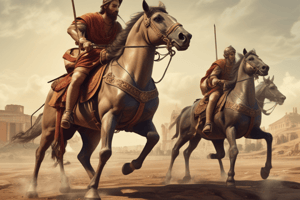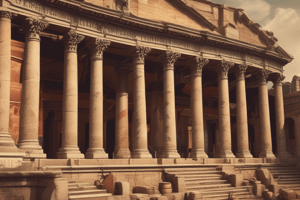Podcast
Questions and Answers
Who took control of the Roman Empire after Julius Caesar's death?
Who took control of the Roman Empire after Julius Caesar's death?
- Brutus
- Pompey
- Mark Antony
- Augustus (correct)
What event marked the end of the Roman Republic?
What event marked the end of the Roman Republic?
- The conquest of Egypt
- The invasion by the Gauls
- The assassination of Julius Caesar (correct)
- The rise of Marcus Aurelius
What characterized the rule of Augustus?
What characterized the rule of Augustus?
- Military oligarchy
- Autocratic rule disguised as a republic (correct)
- Anarchic decentralization
- Democratic governance
What ultimately led to the end of ancient Rome?
What ultimately led to the end of ancient Rome?
What influenced the development of Rome through trade?
What influenced the development of Rome through trade?
Who were the legendary founders of Rome?
Who were the legendary founders of Rome?
What event led to the transition from a system of kings to elected consuls and a Senate in Rome?
What event led to the transition from a system of kings to elected consuls and a Senate in Rome?
What saved Rome from destruction in 390 BC?
What saved Rome from destruction in 390 BC?
What contributed to making Rome's legions stronger than its enemies?
What contributed to making Rome's legions stronger than its enemies?
What were the outcomes of the Punic Wars against Carthage?
What were the outcomes of the Punic Wars against Carthage?
Flashcards are hidden until you start studying
Study Notes
- Rome, a city on Seven Hills and capital of Italy, was once a tiny tribal settlement of the Latins by the River Tiber.
- Rome's neighbors, the Etrusans to the north and Greek colonies to the south, influenced its development through trade.
- Rome offered migrants an opportunity to become citizens, making it the largest metropolitan city of the ancient world.
- The Romans believed they were descendants of refugees from the Middle East who had survived the Trojan War.
- Romulus and Remus were the city's legendary founders, and each of the seven early kings left a lasting legacy.
- The Romans borrowed military and government organization from the Etrusans while maintaining their patriarchal simplicity.
- The first king, Romulus, was expelled after raping Lucrecia, and Rome transitioned to a system of elected consuls and a Senate.
- The Senate and Roman people formed the basis of Roman government.
- Rome was saved from destruction by the geese of the Capitoline Hill in 390 BC, leading to military reforms and a more mobile Roman legion.
- Rome's constant wars allowed it to form alliances and gain recruits, making its legions stronger than its enemies.
- Rome's expansion led to the Punic Wars against Carthage, which ended with Carthage's destruction and the enslavement of its population.
- Roman power and influence spread throughout the Mediterranean, and Rome's empire grew to encompass much of Europe and the Middle East.
- Rome's economy and population grew, leading to social unrest and the rise of social mobility through the army.
- Julius Caesar, a popular general, seized power in 49 BC, leading to a series of civil wars and the end of the Roman Republic.
- Augustus, Caesar's adopted son, took control of the empire in 31 BC, ruling until his death in 14 AD.
- Augustus maintained the appearance of the Republic but ruled as an autocrat, beginning the Roman Empire.
- The Roman Empire experienced periods of peace, prosperity, and cultural development, but also periods of terror and chaos.
- The empire eventually fell to the onslaught of external forces and internal decay, leading to the end of ancient Rome.
- Uris, a simple baker, was the last ruler of Rome, hinting at the city's origins as a settlement founded by migrants.
Studying That Suits You
Use AI to generate personalized quizzes and flashcards to suit your learning preferences.




